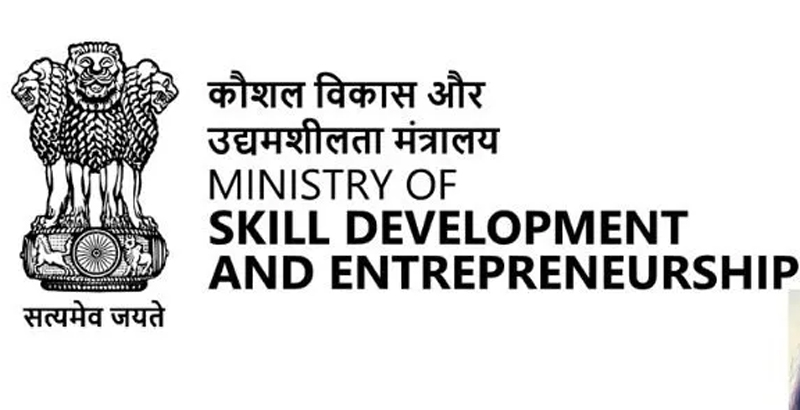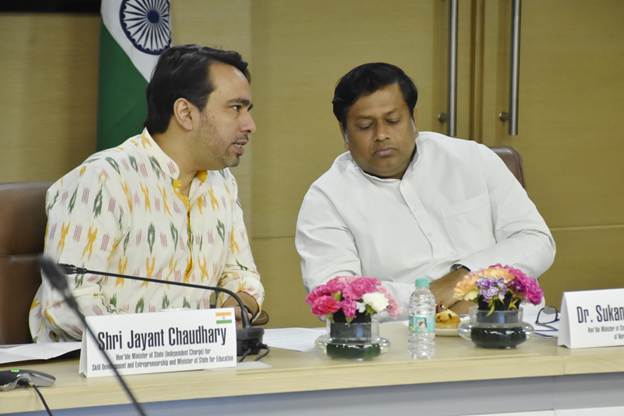India Skills Accelerator Initiative

- 27 Jul 2025
In News:
The Ministry of Skill Development and Entrepreneurship (MSDE), in collaboration with the World Economic Forum (WEF), deliberated on the “India Skills Accelerator” initiative.
Key Highlights:
- Launched by: Ministry of Skill Development and Entrepreneurship (MSDE)
- Collaborating Partner: World Economic Forum (WEF)
- Announced on: 8th April 2025 during a high-level roundtable at Kaushal Bhawan, New Delhi
- Objective: To strengthen India's skilling ecosystem through inclusive upskilling and reskilling, enhanced government-industry collaboration, and investment in lifelong learning, particularly in high-growth sectors such as Artificial Intelligence, robotics, and clean energy.
- Key Features:
- Public-Private Collaboration: Structured as a national platform bringing together government and private sector stakeholders; notably, 2 of the 4 co-chairs are from the private sector.
- Focus Areas:
- Promotes scalable and adaptive training models
- Facilitates agile career transitions for the workforce
- Aligns education and training with evolving industry demands
- Strategic Approach:
- Raising awareness and changing perceptions about future skills
- Encouraging cross-sectoral collaboration and sharing of best practices
- Reforming institutional frameworks to support a responsive and dynamic skilling system
- Significance: The initiative is aligned with India’s goal of building a future-ready workforce by addressing skill mismatches and preparing youth for rapidly transforming industries. It contributes to the broader national missions like Skill India, Digital India, and Make in India.
India Skills Accelerator Initiative (2025)

- 09 Apr 2025
In News:
The Ministry of Skill Development and Entrepreneurship (MSDE) has partnered with the World Economic Forum (WEF) to launch the India Skills Accelerator—a national-level public-private collaboration platform aimed at fostering a future-ready and inclusive workforce.
Key Features:
- Purpose: To act as a systemic change enabler in India's skilling ecosystem through a multi-stakeholder, cross-sectoral approach.
- Core Objectives:
- Enhance awareness and shift mindsets about the need for future skills.
- Promote collaboration and knowledge sharing between government, industry, and academia.
- Reform policies and institutional structures for an agile and responsive skilling framework.
- Sectoral Priorities:
- Focus on high-growth areas: AI, robotics, cloud computing, cybersecurity, advanced manufacturing, energy, and Global Capability Centres (GCCs).
- Emphasis on formalizing the informal workforce.
- Lifelong Learning: Mobilize investments in upskilling and reskilling across various life stages to support agile career transitions.
- Data-Driven Governance: Use surveys, mapping tools, and the WEF’s Global Learning Network for peer benchmarking and progress tracking.
- Implementation Strategy:
- Identify 10–12 high-impact priorities with measurable outcomes.
- Establish thematic working groups to ensure coordinated execution.
- Align initiative with the WEF’s Future of Jobs Report 2025.
Significance
- Addresses the fact that 65% of organizations cite skill gaps as a major barrier to growth.
- Positions India to leverage its demographic dividend and become the "Skill Capital of the World".
- Supports India's goal of skilling not just for domestic needs but also for global workforce demand.
- Reinforces federal cooperation, involving institutions like NSDC, NCVET, DGT, UGC, AICTE, NCERT, and CBSE.
